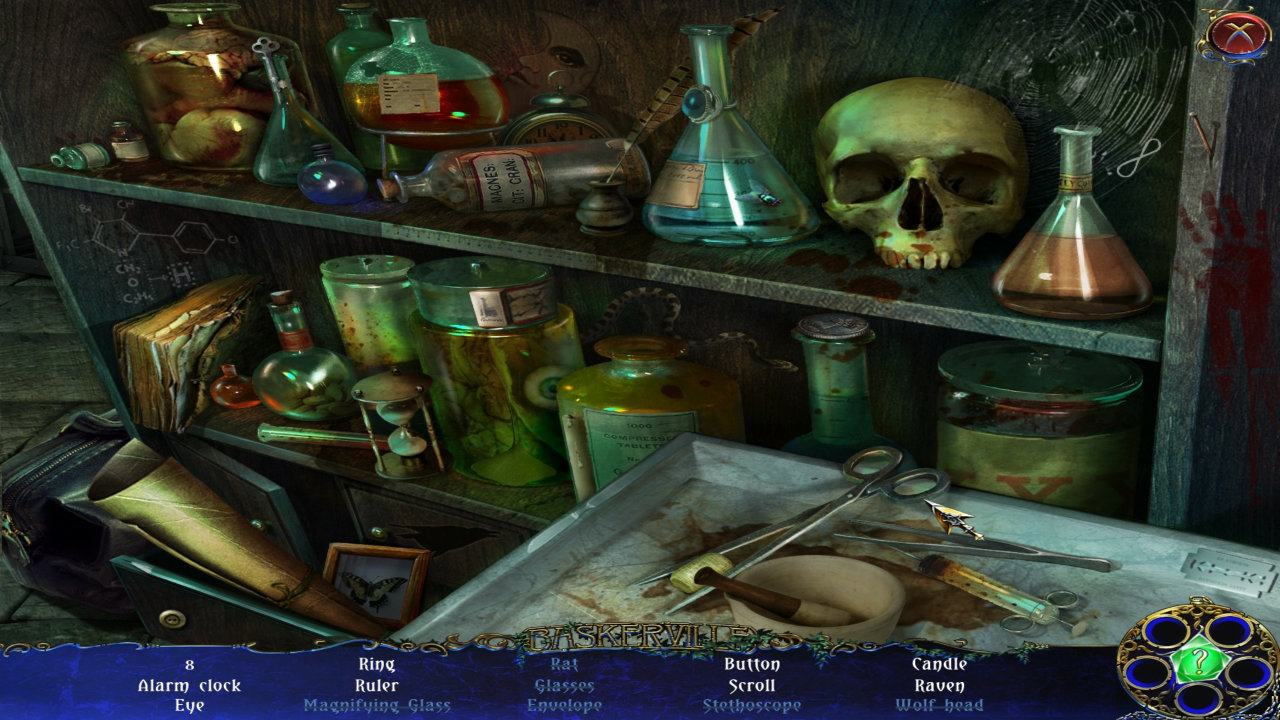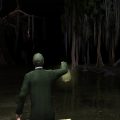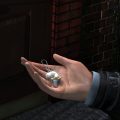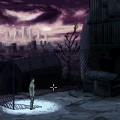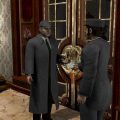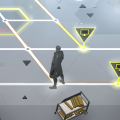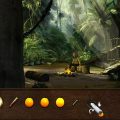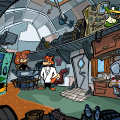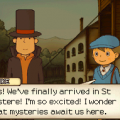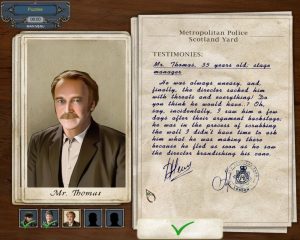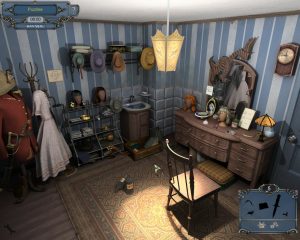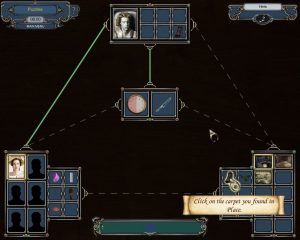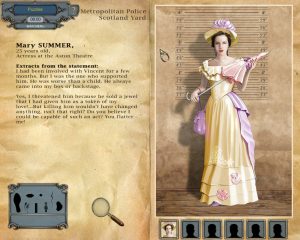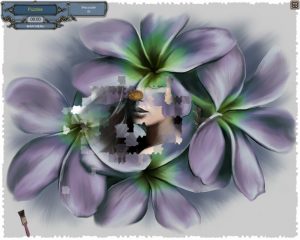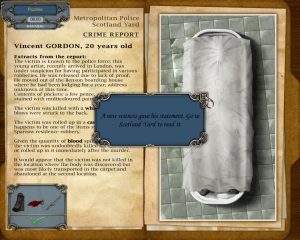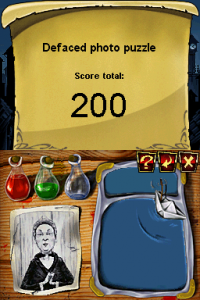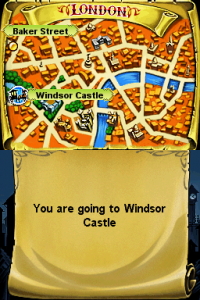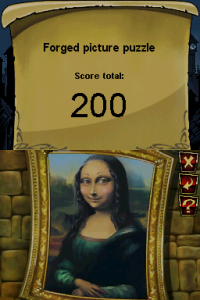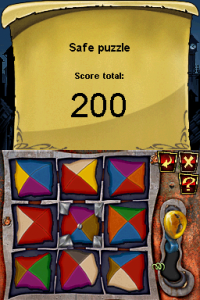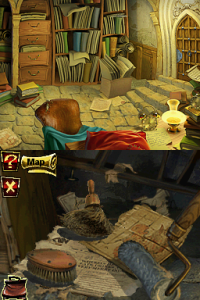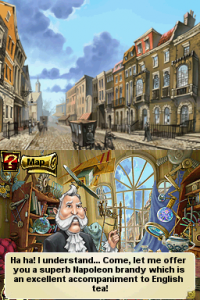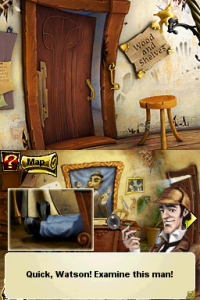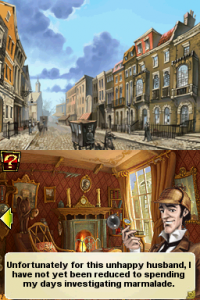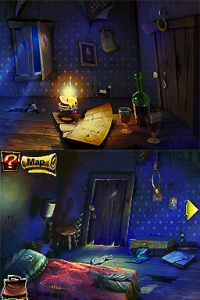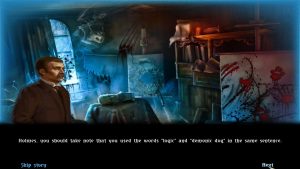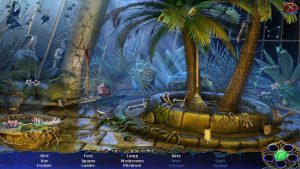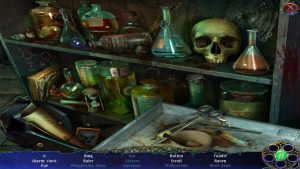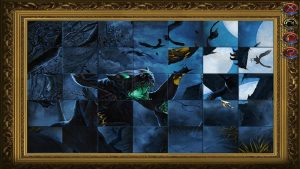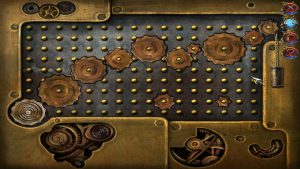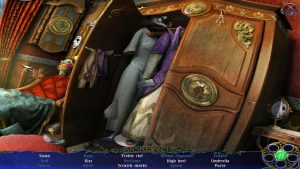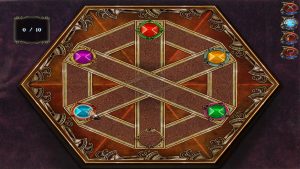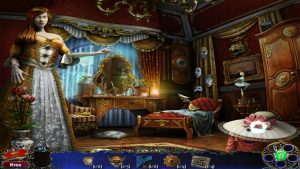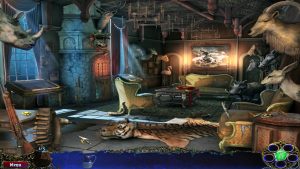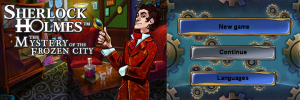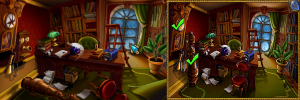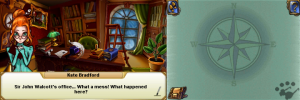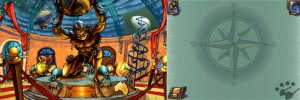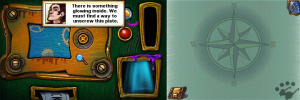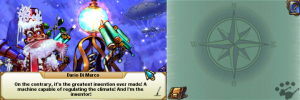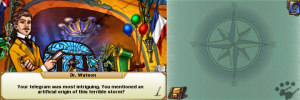- Sherlock Holmes: The Mystery of the Mummy
- Sherlock Holmes: Secret of the Silver Earring
- Sherlock Holmes: The Awakened (2006)
- Sherlock Holmes: Nemesis
- Frogwares’ Sherlock Holmes Casual Games
- Sherlock Holmes Versus Jack the Ripper
- Testament of Sherlock Holmes, The
- Sherlock Holmes: Crimes & Punishments
- Sherlock Holmes: The Devil’s Daughter
- Sherlock Holmes: Chapter One
- Sherlock Holmes: The Awakened (2023)
Sherlock Holmes: The Mystery of the Persian Carpet – PC, Mac OS X (2008)
- Developer: Frogwares
- Publisher: Big Fish Games
- Director: Aurélie Ludot
- Genre: Casual, Hidden Object
- Themes: Criminal Investigation, Licensed, Period: Victorian, Player: Sleuth
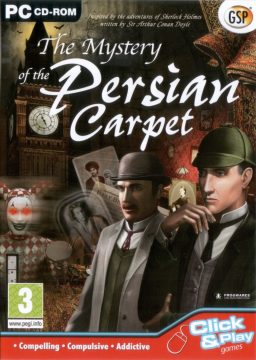
The Mystery of the Persian Carpet was Frogwares first attempt at getting into the casual adventure and hidden object game market, even getting Big Fish Games as a publisher. For those unaware, Big Fish Games are the undisputed kings of the market, even to this day, and were major players in the huge casual game explosion on PC and mobile. Frogwares getting in on the scene makes sense, and they’d make two games under Big Fish Games’ banner. The first of them is…quite bad.
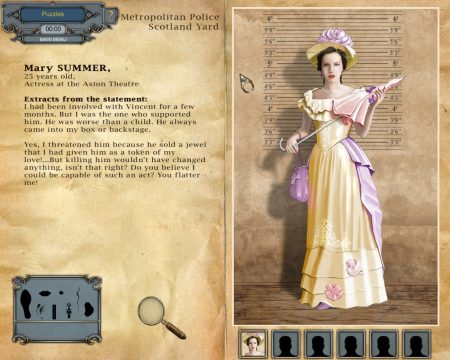
Persian Carpet has a story but it’s hard to pay any attention to it. The awful and unnecessary text boxes whenever you finish a segment offer no real context, all you really have is the initial shoddy looking dialog about finding a corpse in a fancy Persian carpet and big dumps of text on some screens where you’re busy looking for clues. This makes it even harder to not notice the absurd level of asset reuse.
That normally isn’t something worth complaining about. Frogwares have been doing that for awhile already, reusing music tracks, entire areas, and character models. The reason it sticks out here is because it just takes major story areas from Silver Earring and slaps them in with no rhyme or reason, and those screens are absolutely awful for hidden object searching. Some of the stuff you have to find is so small and blends so well into the area that you have to wonder if you were ever expected to find them without the limited hint system.
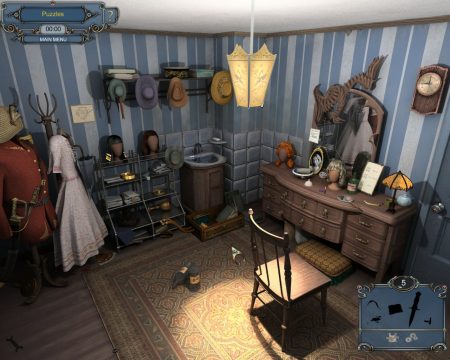
The more perplexing angle to all of this is that the team did put effort into this game in terms of systems and design. There are a bunch of modes to go through, from scene investigation to body examinations, and even working in Sherlock’s work bench for examining clues. This is all fine on paper. The problem rises when you realize there is no context for any of this. There is rarely a moment you understand just what exactly you are doing or why, and it all leads to the confusing deduction board. You have to make connections between the crime, clues, and suspects, but the lack of text makes it all abstract. It’s like you’re just vibing and choosing whatever, and maybe it will lead to a conclusion.
What we have here is not a finished game, but parts of one just sort of thrown together. It’s too complicated to be a fun casual experience (especially with poorly copy and pasted puzzles from the mainline games, including the awful cuneiform puzzle), and too empty to be a satisfying Sherlock Holmes adventure. It tries being two things and ends up being neither. Thankfully, Frogwares did learn from their failure here.
Sherlock Holmes and the Mystery of Osborne House – DS (2010)
- Developer: Frogwares
- Publisher: THQ, Focus Home Interactive
- Director: Aurélie Ludot, Pascal Ensenat
- Genre: Adventure: Point and Click, Puzzle
- Themes: Criminal Investigation, Licensed, Period: Victorian, Player: Sleuth
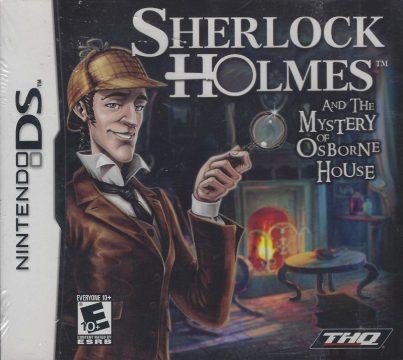
Here it is, everyone: Professor Layton at home. Mystery of Osborne House is a DS game side project and Frogwares second attempt at making a satisfying casual experience, and they finally found their footing here. The trick to it was to stick to their strengths: Funny Holmes and Watson back and forth, a little puzzles to mess with. Add in a little murder mystery that is hilariously placed alongside goofy comic art and little clouds of flies that buzz around corpses, and you have a solid time waster.
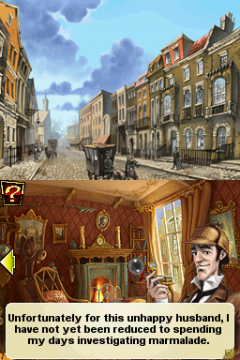
To give you an idea of what the tone of this game is, the story begins with Sherlock Holmes and Doctor Watson getting an invitation from Lord Brainstorming at 14 Nutcase Street. Holmes messes around with weird inventions like a “toaster” and then finds a secret message after getting home that sets him on the trail of a series of murders. There’s a point in this game where you go in an apartment with a dangling noose where you question if a man committed suicide in here. Yes, this game is sort of deranged and that should be respected.
The point and click elements are light with some short investigation bits and dialog. The rest of the focus is on puzzles, where the effort was clearly put. There is a hint system so you can continue on with the game if one is stumping you, but Frogwares thought ahead and gave an incentive to not abuse that. There’s a scoring system in the game that unlocks bonus puzzles, with points you earn finishing a puzzle or making a proper deduction on the case. Using hints gives a penalty to these points, encouraging you to try and think it through a bit longer, while keeping in a life line for less clever players so they can finish the game. It’s a nice touch.
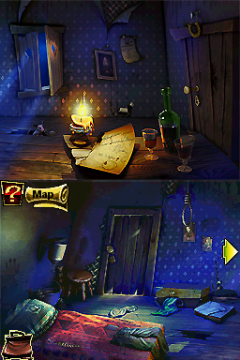
Presentation is simple but gets the job done, the music passable and easily ignored, while the art style has a lot of personality that occasionally contrasts against the murder story to hilarious effect. The Professor Layton inspirations are obvious, but as far as knock offs go, you can do worse. If there’s any major flaw, it’s that the main story is pretty short, which didn’t fly as much as it used to once we hit the DS era. That aside, yeah, it’s a fun time and worth checking out.
Sherlock Homes and the Hound of the Baskervilles – PC, iOS, iPad (2011)
- Developer: Frogwares, Waterlily Games
- Publisher: Frogwares, Big Fish Games
- Genre: Casual, Hidden Object
- Themes: Criminal Investigation, Horror, Licensed, Period: Victorian, Player: Sleuth
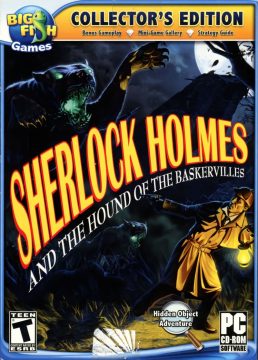
Hound of the Baskervilles is, hands down, the best effort from Frogwares casual experiment, even given its own subteam in the form of Waterlily Games. It is also the most derivative in the most derivative genre gaming has ever had. Not a bad thing, mind you. These casual hidden object games are popular for a reason, and Frogwares’ second attempt at one took a lot of notes at what worked about them, with their own dash of flavor to make it pop.
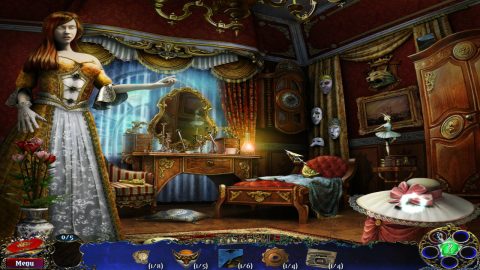
While this is named after one of the most famous stories of Sherlock Homes canon, this is actually a story about a haunting of an actual demon dog. One of the last remaining Baskervilles has hired Holmes to look into his family curse to figure out why his family keep dying early, only for it to quickly become clear that, yes, there is a demon dog, there are ghosts, and Holmes and Watson find a magical amulet that slowly gains various Stand powers. There is also time travel. Gotta put the gem eyes in the wolf heads for that, naturally.
What makes this work is the script makes sure to keep Holmes and Watson sounding like their mainline selves, complete with the voice actors used for both up to the final crossover game. It’s hard not to be amused at Sherlock being initially hesitant to accept magic is happening and then later just logically understands its real and starts saying sentences that would have made him sound crazy in any other context. Even Watson has to step in at one point to question what he just said in a really amusing dry bit.
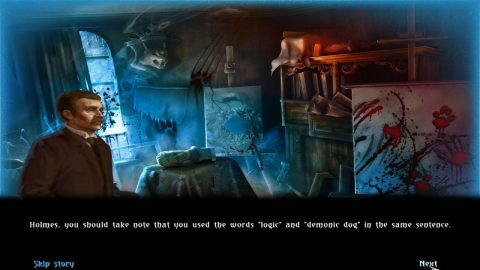
The game itself is a proper hidden object game, very polished with a strong art style, busy screens to explore, and a good mix of item puzzles, proper puzzles, and using Stand powers to find pieces of coat of arms to unlock more Stand powers. The puzzles are both simple and satisfying, and the hidden object segments are properly designed, with a lot of clever visual tricks to keep them from being too easy. Also, the game ends with Sherlock Holmes holding a puppy. That’s a full point right there.
It’s the sort of simple casual game that speaks for itself. You play it, and you can see it’s good, there was thought in how everything was put together, and you even get good puzzle and progress grouping that naturally moves you from beat to beat. There’s even replay value with some achievements unlocking by not using hints or the like. This one is just straight up good and can be beat easily in three hours, so give it a shot.
Sherlock Holmes: The Mystery of the Frozen City – 3DS (2012)
- Developer: Frogwares, Waterlily Games
- Publisher: Focus Home Interactive
- Genre: Adventure: Point and Click, Puzzle
- Themes: Criminal Investigation, Licensed, Period: Victorian, Player: Sleuth, Steampunk
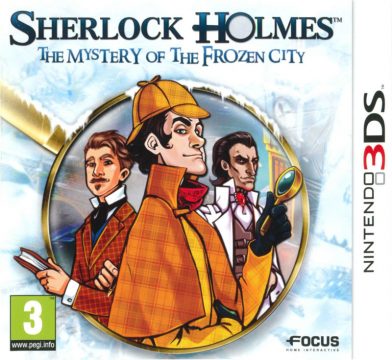
Oh, Professor Layton at home put on a new hat. Mystery of the Frozen City was the last casual Sherlock Holmes game that Frogwares and Waterlily ever made and it did not do well. Sales data is not highly advertised, but the game’s near non-existence online, along with below average to negative review scores and lack of any further casual games in a decade kind of says everything. Releasing it on the 3DS was probably their biggest mistake, because if the DS was already becoming a poor place for low content casual games, it would only be worse on the 3DS and its expensive gimmicks.
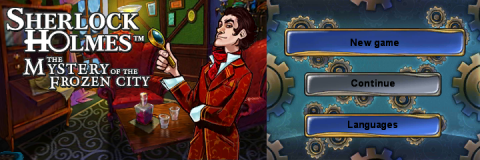
There’s also a huge issue apparent from the start of the game. The art style is fairly lame. The character portraits look expressive, but you may have noticed they do not fit with the Victorian period setting of the franchise, and the environments are even worse. The main areas look like part of Santa’s work shop more than any sort of building in Victorian London. It simply looks generic, not matching a particular feel or genre. It is Casual Game Art Style and little else.
The story also completely jumps the shark. Your goal is to go around an exhibition put on by a bunch of super scientists, gather gems, and use them to shut down a weather machine before it freezes London. Yes, you read that right: A weather machine. The script is also pretty bare bones, so there’s not even much fun had with the out there concept. This was a legitimate problem for a few critics, and it’s not hard to see why. Osborne House and Baskervilles both managed to have a satisfying little story to contextualize the gameplay, but Frozen City‘s attempts just don’t click with the complete abandoning of the theme.
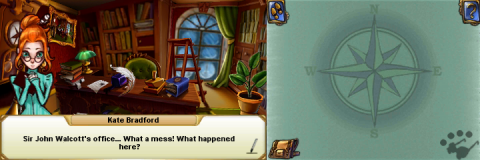
Otherwise, it’s just Osborne House with some more content and that’s about it. This is a problem because audiences were expecting more at this time. Professor Layton and Ace Attorney were setting high bars for these sorts of games on these sorts of consoles, and Frozen City just lacks the ambition and detail to come anywhere near, not even standing out as a casual alternative. Even the 3D gimmicks are poorly used with the simplistic art style, which would have been better off remaining completely 2D.
After this release, Frogwares would focus on their main series and other IPs here and there. Probably for the best, because there was another strange issue probably holding these games back not yet discussed. See, while these games were coming out, some of the darkest games in the main series were releasing. In fact, the next one might take the cake, as Sherlock Holmes would face his most perverse foe yet: Jack the Ripper.
